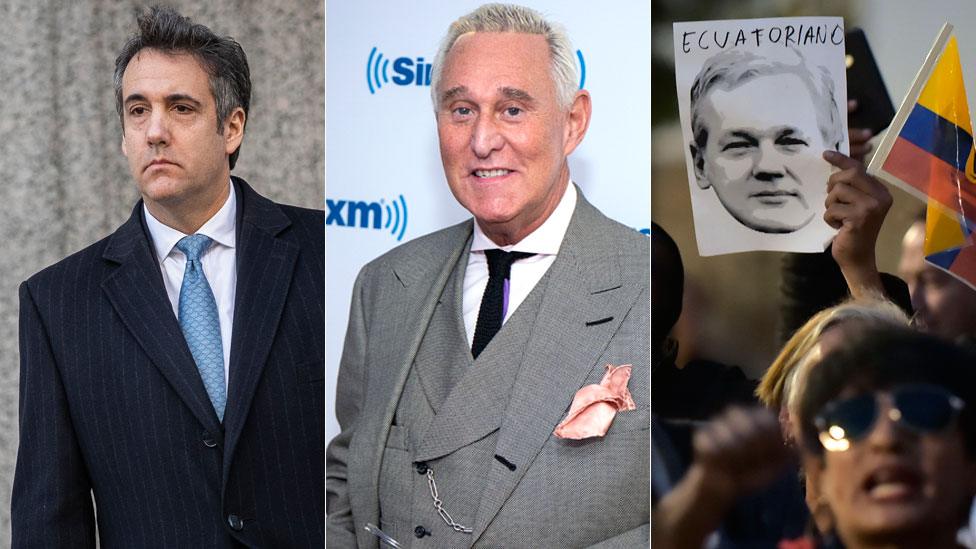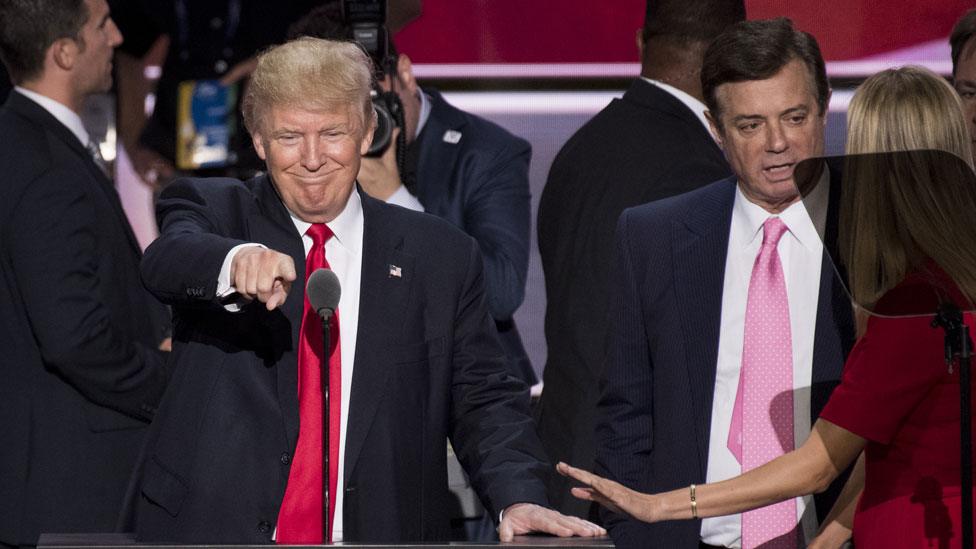Trump Russia: What (else) we've just learnt about Mueller probe
- Published
The BBC's Anthony Zurcher analyses Mr Trump's response.
With the US mid-term elections over, attention in the US again quickly returned to when Robert Mueller would make His Next Move. It turns out the wait was just over three weeks.
In what could be a blockbuster move, the special counsel has revealed his first new plea deal in 10 weeks, reaching an agreement with Donald Trump's former personal lawyer, Michael Cohen.
Up until now, Cohen's legal entanglements had been centred on the US attorney's office in lower Manhattan - involving tax and campaign finance misconduct. It was certainly a headache for the president, but it was separate from Mr Mueller's investigation into 2016 Russian election meddling and possible ties to the Trump presidential campaign.
Now Cohen looms large in that investigation, sharing information about his involvement in possible Russian business deals during the 2016 presidential election cycle.
It's big news. But lots more happened this week - here's a look at some of the other things you may have missed.
1. What Roger Stone knew
On Tuesday multiple US media outlets reported on what appears to be a draft plea deal that was presented by the special counsel's office to Jerome Corsi, a conservative author and a former employee of the conspiracy website InfoWars.
The agreement, which closely resembles documents filed by Mr Mueller's team in other cases, says that long-time Trump associate and former campaign adviser Roger Stone (identified as "person 1") asked Mr Corsi on 25 July, 2016 - in the middle of the presidential campaign season - to reach out to WikiLeaks founder Julian Assange days after the group had released hacked Democratic National Committee emails and documents.

Michael Cohen, Roger Stone and Julian Assange
Mr Stone, according to an email cited by the agreement, wanted to find out what other illicitly gained information WikiLeaks ("organisation 1") possessed.
On 2 August, Mr Corsi emailed Stone saying there were two new email dumps coming - with damaging information about Mrs Clinton's health and the Clinton Foundation. (WikiLeaks would publish Clinton campaign chairman John Podesta's hacked emails 10 weeks later, complete with some embarrassing details but not on her health or charitable foundation matters.)
A few weeks after that Corsi email, on 21 August, Mr Stone sent out a tweet that has become a central part of the investigation into whether anyone connected to Mr Trump had advance knowledge of the WikiLeaks hacked emails.
"Trust me," Mr Stone wrote, "it will soon be Podesta's time in the barrel."
On Tuesday, the Wall Street Journal reported that Mr Corsi had told a grand jury empanelled by the special counsel that Mr Stone had asked him to help come up with a "cover story" for that Podesta tweet.
In the draft deal, Mr Corsi would have pleaded guilty to lying to the FBI about his efforts to contact Mr Assange, who has confined himself to the Ecuadorian embassy in London to avoid extradition to Sweden for sexual assault charges since August 2012.
He would also admit to deleting relevant emails in an effort to obstruct the investigation.

Julian Assange
Mr Corsi says he rejected the deal because he did not knowingly lie to investigators and a sealed guilty plea might have resulted in the revocation of his licence to work as a financial securities broker.
Mr Stone has confirmed the authenticity of the emails, but he denies having any advance knowledge about the WikiLeaks documents. He told the Washington Post that he was only engaging in "political gossip".
The special counsel's office has declined to comment on the authenticity of the draft deal or anything else related to this story.
In previous indictments, the special counsel has alleged that Russia was behind the hacks of Mr Podesta and Democratic Party officials - a conclusion echoed by the US intelligence community.
It has also asserted that WikiLeaks was the outlet chosen by the Russians to inject the purloined documents into the US political bloodstream during the hotly contested presidential elections.
Now, it appears, Mr Mueller's team is aggressively pursuing inquiries into whether there are any lines that go from WikiLeaks directly to the Trump campaign.
Mr Stone, who has said in the past that he suspects he will be indicted at some point, could be a key piece of the puzzle.

2. What Trump knew
The Corsi news is particularly noteworthy because it pulls the curtain back a bit on the next phase of the Mueller investigation - the heart of his mandate to probe possible ties between Russia and the Trump presidential campaign. It wasn't the only bit of relevant news on the special counsel investigation this week, however.
On Wednesday CNN offered the first possible glimpse at the answers Mr Trump gave the special counsel, external in response to written questions related to the Russia probe.
The president, according to two sources, writes that he did not talk to Mr Stone about WikiLeaks and had no prior knowledge about the June 2016 Trump Tower meeting between Donald Trump Jr and other campaign officials and a group of Russians.
Mr Trump Jr had been told prior to the meeting that the Russians had information that would incriminate Democrat Hillary Clinton, as part of that country's alleged efforts to support the Trump campaign.
"If it's what you say I love it," the eldest Trump son replied in an email.
The president has publicly denied any advanced knowledge of this meeting and insisted that it was a routine effort to gather information about a political opponent that ended in nothing. Now it seems he has made similar statements under oath - although the CNN sources say the president qualified his answers by writing that they were "to the best of his recollection".
Needless to say, if evidence emerges that Mr Trump was informed in advance of the Trump Tower meeting - which included Trump Jr, Manafort and son-in-law Jared Kushner - that could be politically and, at this point, legally explosive.

3. A blocked phone number
California congressman Adam Schiff, who is set to chair the House Intelligence Committee when Democrats take control of the chamber in January, says one of the first things he will investigate is whether Mr Trump Jr spoke with his father about the meeting.
In particular, he says he's interested in a phone call the son made to a blocked number the evening after his "I love it" email confirming the meeting with the Russians.
"Republicans refused to look at the phone records so that we could find out [the recipient of the call] because they were afraid of what the answer might be," Mr Schiff told USA Today, external.
According to an article in Observer.com, external, however, Mr Trump Jr's attitude toward the inquiry is a "yawn".
The website - formerly the New York Observer, which Trump son-in-law Kushner purchased in 2006 - cites a friend of Mr Trump Jr's saying the number wasn't blocked, it was "private" and that he makes thousands of calls a day and can't be expected to remember each one.

4. Manafort denies meeting Assange
Speaking of explosive revelations, on Tuesday morning the Guardian reported that Manafort met with Mr Assange at the Ecuadorian embassy in London in 2013, 2015 and March 2016, just as Manafort was pushing to get involved in the Trump campaign.
If true, this could be another possible line between WikiLeaks and the Trump team - and would be of considerable interest to the special counsel's office.
There are a number of big "buts" to attach to this story, however.
First, the Guardian has weakened the language of the article since it was first published, with the addition of some conditional tenses and words like "apparent" and "might have".
Second, WikiLeaks has vehemently denied the story, questioning the author's credibility and threatening a lawsuit for libel against the newspaper. Manafort, as well, has pushed back against report, saying he never met Mr Assange.
Then again, WikiLeaks and Mr Assange also denied having any contact with long-time Trump associate Roger Stone - and it later turned out they were in communication, external in October 2016.
Other news organisations have yet to independently confirm any of the Guardian's reporting. That this story came out on the heels of Mr Mueller's court filing that Manafort had repeatedly lied and was in violation of his plea agreement to co-operate with the investigators has raised eyebrows, however.
The special counsel's office has told the judge overseeing the case that it will offer a "detailed sentencing submission" that explains the extent of Manafort's misconduct. If the submission is made public, it could be extremely revealing.

..but he did go to Ecuador
CNN's Carl Bernstein has also reported that the special counsel's office is investigating a May 2017 trip Manafort made to Ecuador, where he met that nation's president, Lenin Moreno.
The Ecuadorian president's office has explained that the meeting was regarding Chinese investment in a state-owned power company, but Mr Mueller's team is reportedly interested in whether Mr Assange or WikiLeaks came up in conversations.

Manafort flanks Trump at the 2016 Republican National Convention, when campaign manager

6. An accidental slip
In more Assange news, the Reporters Committee for Freedom of the Press tried to convince a federal judge on Tuesday to reveal whether the WikiLeaks founder had been secretly indicted by the US government.
The effort relates to the accidental inclusion of Mr Assange's name in an unrelated indictment, prompting speculation that a government lawyer had used an Assange-related document as a template and forgotten to change all the references.
"The only thing we've admitted is we made a mistake," a government lawyer told the judge.
If Mr Assange does have secret charges filed against him, there's further details on the nature of the indictment - and whether it's at all related to Mr Mueller's probe.
The reporters group "makes a compelling argument that the public has a right to know what the charges are now that the cat is three-quarters of the way out of the bag," a lawyer for Assange told ABC News , externalafter the lawsuit was filed.
The judge said the parties in the case have two weeks to make further arguments in the case before she renders her decision.

7. Big trouble or big boost?
In his recent book, Trump's Enemy, former Trump presidential campaign manager Corey Lewandowski writes that, for all his grousing about the "witch hunt" investigation, the president himself feels the Mueller probe has made him politically more powerful.
"I think it makes my base stronger," Mr Trump tells Lewandowski in the book. "I would have never said this to you. But I think the level of love now is far greater than when we won."
Will the love still be there after Mr Mueller is done? It's now closer to the day Mr Trump could be re-elected than it is to the day he first won. The time is coming when voters will have a chance to prove him right - or wrong.